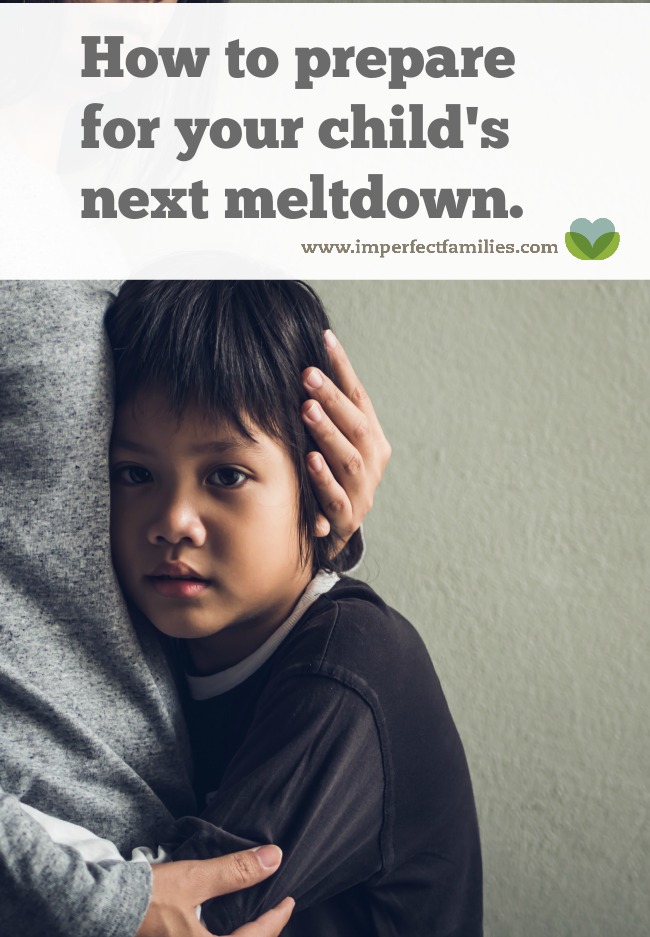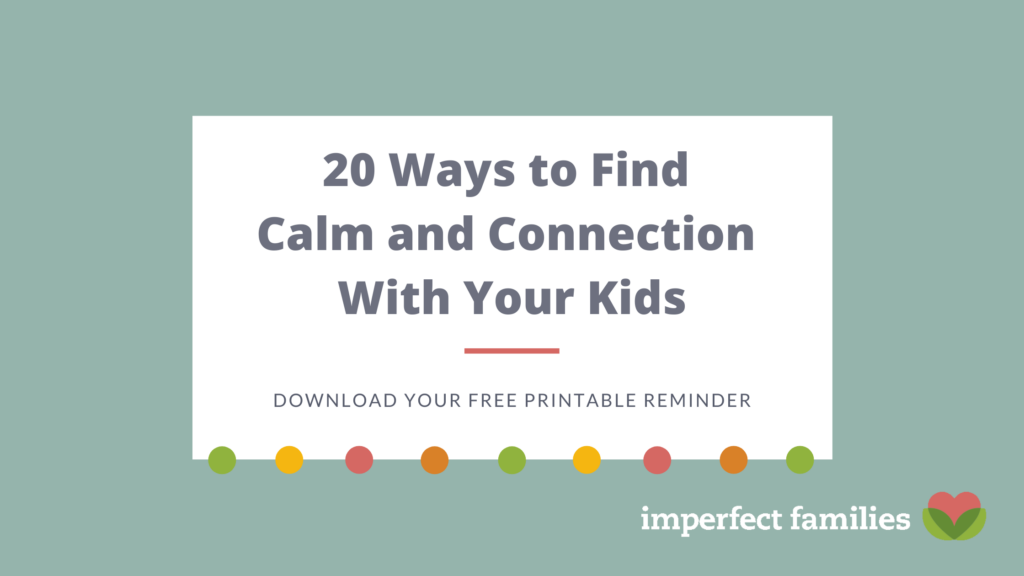
How to Prepare for Your Intense Child’s Next Meltdown
Glancing at the clock, you mentally cross your fingers.
You’re parenting alone tonight and your energy is running low. It would be great if your child made it to bedtime without a meltdown.
For your sake.
For your other children’s sake.
You know he can’t help it. Some nights are just harder than others. He’s learning a lot about self-regulation, but the road is slow and the meltdowns are still epic at times.
You can’t just go into another room with him while he’s struggling and leave your 3-year-old to entertain herself.
You can’t take a break outside by yourself when your other kids are at risk to be hurt.
How do you support your child when you have other kids at home or when you are parenting by yourself? How do you prepare in advance when meltdowns seem to come out of nowhere?
Planning ahead when your child is struggling:
- Know your limits. Learn all you can about your triggers. Words, postures, phrases, situations that make it difficult for you to stay calm. Learn how it feels in your body and the thoughts that go through your mind. If you struggle to know how to change these thoughts or get back to calm, seek help from a mental health professional or a parent coach.
- Take care of yourself. Self-care is the first thing to go when we are in a tough stage of parenting. Rather than accepting this as status quo, look for ways to calm your brain and body throughout the day. It can be scheduling time to take deep breaths or prioritizing your daily workout. Seek help from friends or family members for practical needs, if necessary. (Here are some simple self-care ideas.)
- Make a calming plan ahead of time. We do not think clearly in the heat of the moment. If you’ve started realizing your limits and needs, you may have a few ideas that will help you stay calm and grounded when things get heated. Make a list or create a visual reminder. (Of course, plans may have to be altered in the moment to accommodate your child’s needs.)
- Be curious about your child’s cues. Behavior seems random until we stop and look for patterns. Notice how certain circumstances, environmental cues, words, and physical needs like hunger or thirst affect your child’s needs. Realize that “hidden” things like being bullied at school or getting a bad grade can also affect your child’s mood. (Here’s a list of things that impact behavior.)
- Talk to siblings privately. Take some time when things are calm to talk with siblings who may be in the house during challenging moments. Listen to their fears, worries, concerns, and answer any questions they have – now, or in the future. Assure them that you are committed to helping their sibling learn to manage their big feelings. (Learn more about talking to siblings.)
- Safety first. Isolation or separation can breed shame and add fuel to your child’s response. However, in some situations, you may need to put precautions in place to keep yourself, your child, or their siblings safe. Explore your options carefully before things get heated so you can clearly think through the pros and cons of safety measures.
In the heat of the moment:
- Stay connected if possible. Too much talking or physical contact may be overwhelming when your child is dysregulated. Instead, look for low-stimulation ways to be present with your child without adding to the chaos. Sitting nearby, rubbing their back, holding their hand, or simply staying quiet.
- Lower your expectations. The middle of a meltdown is not the time to implement a new rule, give a reward, or take away something valuable. It’s also not the time to expect them to “pull it together” or master the skill of respectful conversation. The only expectation at this moment may be for you to take some deep breaths.
- Circle back later. You want to teach your child a lesson, realize what they did was wrong, and apologize. While these may be good ambitions, do not rush these conversations. Give yourself and your child time to calm down completely (maybe even waiting a day or two). Approach these conversations with empathy first, before jumping into teaching or problem-solving.
Do you have support?
When tension is high, it’s nice to have a backup, someone who can support you and calmly intervene when your own emotions get too heated. Unfortunately, that is not always the case. Here are some tips to consider depending on your situation:
- If you have a “same-page” co-parent: Talk about your personal triggers and what situations are more difficult than others. Talk about how you will let the other person know that you need a break. Talk about what to expect when you switch roles in supporting your child. Talk about what to do if one parent appears to need a break, but is not asking for one.
- If you have a “non-same page” co-parent: Talk about your goals and plans for helping your child manage their big feelings. Talk about how they can support you, what is helpful and things they already do that make the process more successful. Do not engage in a battle about “right” or “wrong” parenting strategies, stay focused on your own process and priorities. (Learn more about getting your co-parent on board.)
- If you are parenting on your own: Take deep breaths. Have a drink of water. Focus on a mantra (“She’s having a hard time”). Text a supportive friend. Stay tuned in to your thoughts, feelings and body language and know when you need a break. Give yourself a timeout, or make an excuse to leave the situation, “I need to take out the trash.” If you are in a desperate situation, being flexible may be better than standing firm. Make time to decompress after the incident is over.
Closing his bedroom door, you let out a huge sigh of relief.
Tonight was a good night.
But you know that you’re not out of the woods quite yet. The anxiety and tension you felt is a sign that you’d like to be better prepared next time. That you’d like to have a plan or at least a few options to try.
Grabbing a notebook, you begin scribbling thought and ideas. You’re tired, but this is important.
You want to be ready to support all of your children, to the best of your ability, even when things get chaotic and stressful.
Need more support?

Parenting an angry, anxious, or aggressive child can be exhausting and can leave you feeling emotionally drained. I’d love to be a support for you through this challenging stage of parenting. We will sit down and talk through your specific challenges, and then explore options to help you bring more peace and calm into your home. Learn more about coaching here!



Comments have been turned off to retain the privacy of all families. If you have a question or comment on the topic, you're always welcome to contact me.